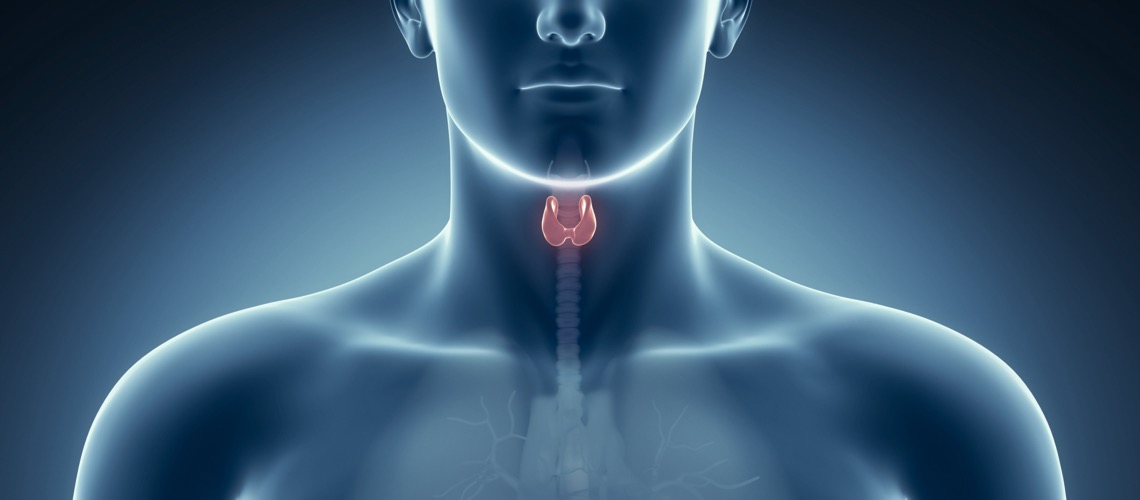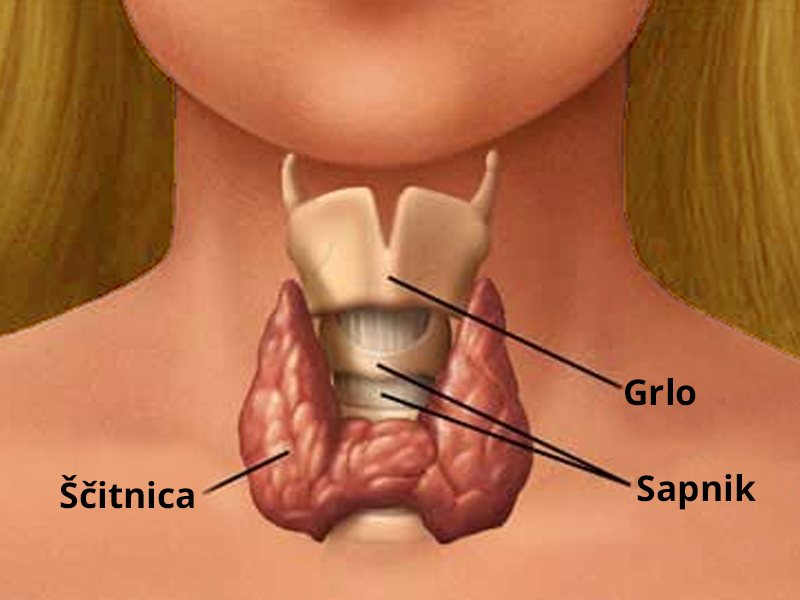The task of the thyroid is to produce hormones thyroxine and triiodothyronine which regulate the body’s metabolism and the hormone calcitonin which in conjunction with parathormone of the parathyroid glands regulates the metabolism of calcium.
Thyroid gland
The thyroid is a butterfly shaped endocrinous gland that consists of two sections connected in the middle by a bridge. It is situated in the lower neck in front of the trachea. An enlarged thyroid causes pressure on the trachea, throat, esophagus and larynx and can cause difficulties in swallowing and breathing. The thyroid produces the hormons thyroxine and triiodothyronine which have a major role in the body’s metabolism. It also produces calcitonin which in conjunction with parathormone of the parathyroid glands regulates the level of calcium in the blood. Increased levels of thyroid hormones accelerate the metabolism while a lack of hormones slows it down. After surgical removal of the thyroid gland its functions are replaced by a small daily pill with thyroid hormones which needs to be taken for the rest of life.
After surgical removal of the thyroid gland its functions are replaced by a small daily pill with thyroid hormones which needs to be taken for the rest of life.
Parathyroid glands are situated directly next to the thyroid. These are two glands the size of a grain of rice on each side of the neck. They secrete parathormone that helps regulate the levels of calcium in the blood. The parathyroid glands are not removed during removal of the thyroid, but the procedure may temporarily stop their functioning.
The recurrent laryngeal nerve travels up the sides of the esophahus and enervates the vocal chords. Before its entry into the throat the nerve travels very close to the place where the thyroid is affixed to the trachea. During surgery the nerve is found and carefully maintained. In spite of the best efforts towards care and accuracy the nerve may become damaged during the procedure. The damage is transitory in most cases. This causes the patient to have a hoarse voice after surgery. The voice improves and normalises for the most part in 4-6 weeks. The risk of such a complication in our establishment is 0.8%. A more severe but fortunately extremely rare complication is damage to both nerves. In such cases the patient has difficulty breathing and loses their voice.

Thyroid disorders
Thyroid disorders are divided in terms of the functioning of thyroid hormones into athyreotic (normal functioning), hyperthyreotic (increased functioning) and hypothyreotic (decreased functioning). Hyperthyreotic patients have an accellerated metabolism. They experience accelerated heartbeat, increased blood pressure, excessive sweating, nervousness, loss of weight and shaking hands. Patients with Graves-Basedow disease may additionally also develop a goiter and bulging eyes. Patients with hypothyroidism experience diametrically opposing symptoms such as fatigue, lethargy, feeling ill, swelling in various parts of the body and gaining of weight.
An enlarged section of the thyroid or the entire thyroid can cause a goiter. The goiter is diffuse when the entire gland is uniformly enlarged. The goider is nodulose (knobby) if it occurs due to the enlargement of one or more nodules in one or more sections of the thyroid.
The most common reason for thyroid surgery is the occurrence of a goiter that causes problems due to its size applying pressure on surrounding structures in the neck. Another reason for removal is also the aesthetic impact of a goiter. Surgical removal is indicated especially upon suspicion of thyroid cancer.
Thyroid cancer
Thyroid cancer is the most common cancer of the endocrinous glands, but still quite rare in comparison to other types of cancer. Fortunately it mostly occurs in the form of well differentiated carcinomas that are curable. The cause for thyroid cancer is unknown. It is often linked to exposure of the neck to X-ray radiation and the factor of heredity is also important. Radioactive iodine therapy is used as a supplemental treatment when traces of thyroid tissue are found in the neck after surgical removal of the gland.
Thyroid surgery
Thyroid surgery is a procedure in which we remove a lobe of the thyroid (lobectomy) or the entire gland (thyroidectomy). The scope of the procedure depends on the nature and scope of the disease. Surgery is performed in general anaesthesia. Patients are admitted to hospital on the day of surgery, spend the night in the hospital ward and are normally released into home care the next day.
Serious complications of the procedure are rare, provided it is performed by a duly trained and experienced surgeon. Complications include bleeding, damage to the recurrent laryngeal nerve causing hoarseness and drop in blood calcium levels due to damage to all four parathyroid glands. The latter complication is extremely rare as a single parathyroid gland is sufficient for normal function. Difficulties and pain during swallowing occasionally occur after removal of large goiters, but are normally transitory. The skin in the area may be temporarily sensitive to touch. Most issues disappear within a few days to a few weeks.
Difficulties in pain during swallowing is a common issue and occurs due to swelling around the surgical wound.
After thyroid surgery patients require temporary or permanent therapy in the form of supplemental hormone tablets. The tablets have no side effects and allow for a completely normal life if they are taken regularly as prescribed. Patients occasionally also need to take additional calcium if blood calcium levels drop too much.
